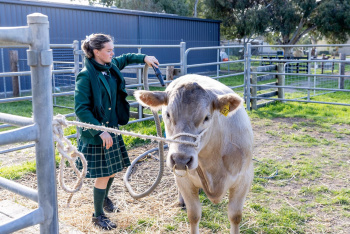
South Australian Science Teachers Association
Agricultural Science at Westminster School
Posted by SASTA
on 14/11/2023

Westminster School have defined a new vision for Sturt Grove Farm that teaches students the importance of sustainable agriculture.
As we upgrade our Farm and Agricultural learning facilities, we are emphasising the indispensability of scientific expertise in all agricultural enterprises. The essence of agriculture is deeply intertwined with science—it’s the meticulous science that unravels the reasons behind the yield of a specific crop, the superior micron yield in certain sheep breeds, and the elevated intramuscular fat content in select Angus cattle genetic lines.
With the initiation of a major Ag project, we are architecting a state-of-the-art learning environment, a realm where agricultural sciences are not mere theoretical entities but are tangibly interwoven with our day-to-day agricultural learning and production undertakings. At the moment, even prior to our facility upgrade, we are ensuring our journey in agricultural sciences is multifaceted, exploring various dimensions of agricultural production. For example, we delve into the art of titration of grape juice during Shiraz veraison to scrutinise and refine its quality, ensuring the production of premium wines with impeccable flavour profiles. This precise method permits an accurate analysis of the acid content, a critical aspect in the wine-making process.
 |
 |
When students look into our lambing program, we have used and are looking to use further microscopy to analyse fat cells in ewes’ milk. Such a detailed approach is pivotal and translates straight into the dairy industry showing the link to the enhancement of product quality and facilitating innovations in dairy science and milk production and processing.
We have also utilised industry links such as the Waite Research Centre to speak directly into Stage 2 Crop Trials based around quality and quantity of barley yields. The Infra-red spectroscopy that accompanies this was another example of the tangible intertwining of high end science and agricultural production.
 |
 |
 |
 |
 |
Our explorations extend to the domain of aquaculture. The meticulous examination of water parameters in Barramundi grow-out tanks and the analysis of the transformation rates of ammonia to nitrates are crucial for maintaining ecological balance and realising sustainable aquaculture practices. Such investigations are imperative for ensuring the health and growth of aquatic life.
Our scientific rigor is not only elevating our agricultural standards but is also enabling the students and the community to comprehend the intricate intricacies and subtleties of contemporary agriculture. The seamless fusion of rigorous science and practical execution is shaping our curriculum as it does in industry. Our mission is to nurture a community who can discern the symbiotic relationship between science and agriculture, impacting diverse disciplines and emphasising the pivotal role of science in agricultural evolution and food security.
National Agriculture Day is this week - Friday 17 November. PIEFA has a wide range of teaching resources to engage your students with agricultural science. Check it out here!
Archive
- February 2026
- January 2026
- December 2025
- November 2025
- October 2025
- September 2025
- August 2025
- July 2025
- June 2025
- May 2025
- April 2025
- March 2025
- February 2025
- January 2025
- December 2024
- November 2024
- October 2024
- September 2024
- August 2024
- July 2024
- June 2024
- May 2024
- April 2024
- March 2024
- February 2024
- December 2023
- November 2023
- October 2023
- September 2023
- July 2023
- June 2023
- May 2023
- April 2023
- March 2023
- February 2023
- January 2023
- December 2022
- November 2022
- October 2022
- August 2022
- July 2022
- June 2022
- May 2022
- April 2022
- March 2022
- February 2022
- January 2022
- December 2021
- November 2021
- October 2021
- September 2021
- August 2021
- July 2021
- June 2021
- May 2021
- April 2021
- March 2021
- February 2021
- January 2021
- December 2020
- November 2020
- October 2020
- September 2020
- August 2020
- July 2020
- June 2020
- May 2020
- April 2020
- October 2018
- September 2018
- August 2018
- July 2018
